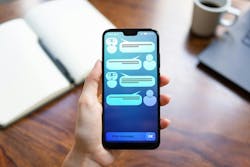Can chatbots help with genetic testing for cancer risk?
In a study from Huntsman Cancer Institute at the University of Utah (the U) and NYU Langone Perlmutter Cancer Center, researchers found that a specialized chatbot can effectively assist patients in deciding whether to pursue genetic testing, offering an alternative to traditional genetic counseling.
Kimberly Kaphingst, ScD, research director of the Genetic Counseling Shared Resource and co-leader of the Cancer Control and Population Sciences Program at Huntsman Cancer Institute, and professor of communication at the U, says the results of the BRIDGE (Broadening the Reach, Impact, and Delivery of Genetic Services) trial could help expand patient access to genetic care.
The BRIDGE trial used an algorithm to find patients at higher risk for inherited cancer syndromes based on their self-reported family health histories.
Researchers then divided more than 3,000 Utah and New York participants into two groups—one pursuing the standard two-appointment model, and the other engaging with a chatbot designed and scripted to provide genetics education instead of having a pre-test appointment with a genetic counselor.
Participants in the chatbot group were sent a message through MyChart, an online patient health portal, recommending genetic services and providing a link to launch a chatbot. They then received information about genetic testing and were able to ask questions to help them decide if they should proceed with testing.
Researchers found outcomes between the two groups were equally likely to complete genetic testing, demonstrating that a chatbot is a viable alternative to the traditional model.
“Our goal wasn't to see if the chatbot was better or for worse. The question was, is a chatbot another model that we can use to offer genetic services to patients and have similar outcomes,” says Kaphingst. “For a lot of people, the chatbot model provided enough information. The chatbot can take some of the burden off genetic counselors and help provide genetic testing to more patients who are eligible.”
Results of the BRIDGE trial have been published in JAMA Network Open.
Huntsman Cancer Institute at the University of Utah release on Newswise

